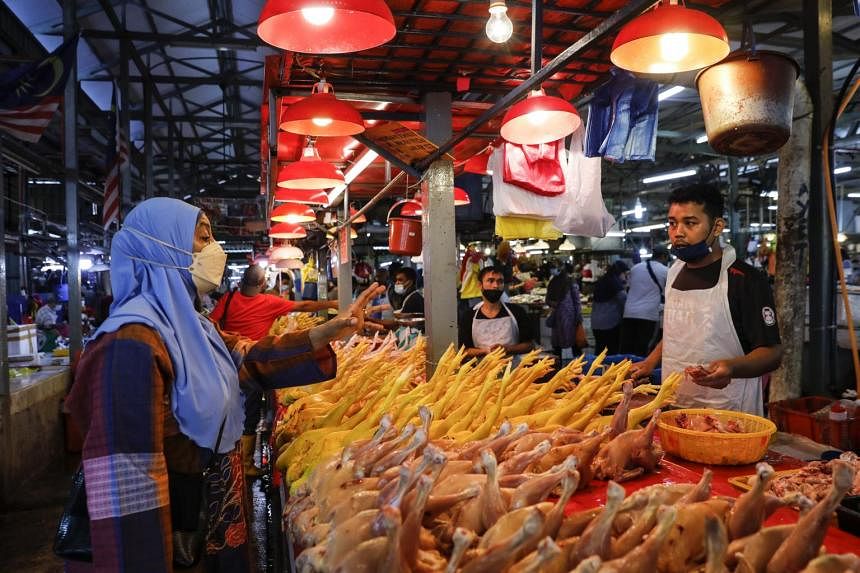Rising chicken prices in Malaysia: Could fish be next?
A customer buying chicken at a wet market in Kuala Lumpur on May 24, 2022. PHOTO: EPA-EFE
Nadirah H. Rodzi
Malaysia Correspondent
May 27, 2022
KUALA LUMPUR - Rising prices for chicken amid
a shortage in Malaysia is just the tip of the iceberg as the country battles a surge in consumer food prices due to global food insecurity.
Apart from chicken, the supply of fish in the country has also fallen 70 per cent, dropping from a million tonnes to approximately 300,000 tonnes a month due to uncertain weather over the past two months.
The National Fishermen's Association (Nekmat) had said that this has caused the price of fish in the market to soar distinctly, with small-sized mackerels being sold at RM12 to RM14 (S$3.80 to S$4.40) per kilogram presently, as compared to RM3 to RM4 before.
"Lower catches and landings have been going on for a while. It explains the high price of fish and the switch to chicken (for the cheapest source of protein)," economist Nungsari Ahmad Radhi told The Straits Times.
"The main reason is that Malaysia didn't really develop its deep sea fishing capability. Of course there's encroachment by foreign vessels, but it doesn't really explain the lack of landing and catching. Fish prices have always been expensive," he said.
However, the inflation in fish is anything but new and there is a bigger issue at play, experts say.
Malaysia is facing a severe chicken shortage, mainly because of its dependence on imports of feed whose prices have surged in recent months.
According to the Department of Statistics Malaysia, inflation as measured by the consumer price index (CPI) increased 2.3 per cent in April 2022 from a year earlier, led by higher food prices.
The overall CPI increased 2.2 per cent in March year on year, mainly driven by the 4 per cent increase in food and non-alcoholic beverages. Prices of food items including chicken and vegetables spiked more than 10 per cent last month.
April saw the CPI for milk, cheese and eggs increase at a faster pace of 7.2 per cent, compared with 7 per cent in the previous month. Inflation for meat climbed 6.2 per cent, vegetables 4.5 per cent, and fish and seafood 3.8 per cent.
"The increase in food inflation, which made the highest contribution to the overall weight of the CPI, remained to be a major contributor to inflation," Department of Statistics Malaysia's (DOSM) chief statistician, Datuk Seri Mohd Uzir Mahidin said in a statement on Wednesday.
Leong Hup International, one of the largest producers of poultry and eggs in South-east Asia, reported 26 per cent year-on-year revenue growth for livestock and poultry for the first quarter of this year due to stronger exports and higher domestic egg prices. However, its profitability slumped 63 per cent year on year, due mainly to higher costs of animal feed.
According to Maybank Investment Bank's report released on Wednesday (May 25), livestock segment margins plunged by 7.3 percentage points year-on-year for the quarter as the poultry giant was unable to pass on its higher costs to consumers due to government poultry price controls during the period.
"The Russia-Ukraine war and the sanctions imposed thereafter have affected the supply as well as the supply chains of everything. Cost wise, transportation costs have gone up with oil and gas prices. Of course, all grains and agriculture inputs have gone up, too," Dr Nungsari said.
"So, food prices and supply will be a global problem for the foreseeable future... even if the war stops tomorrow."



